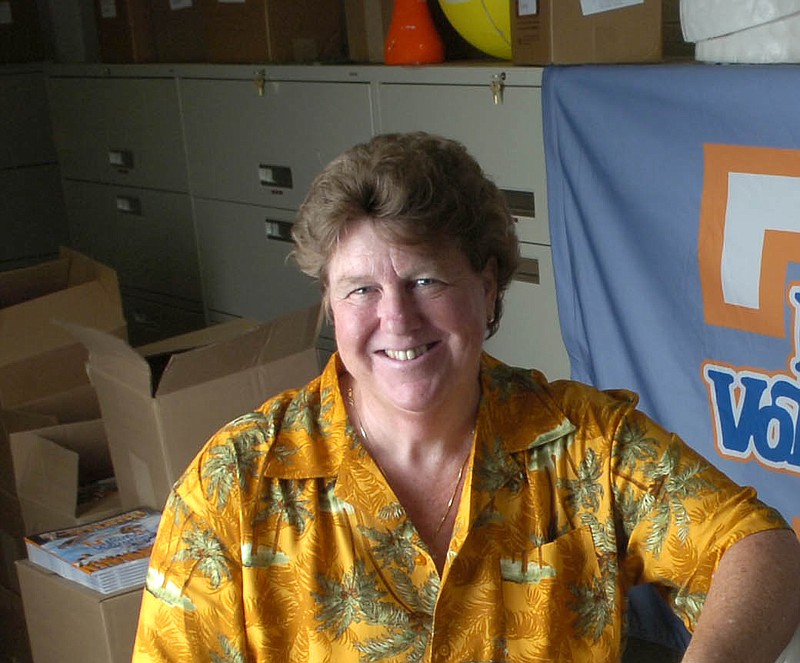So was she or wasn't she?
Was Pat Summitt forced out as the University of Tennessee women's basketball coach last spring, as she declared in a sworn affidavit filed this past week in U.S. District Court?
Or was her exit really "entirely my decision," as she said in a statement issued Friday that was intended to, according to the release, clear up "some misunderstandings" regarding the affidavit?
Oh, to have been a fly on the wall whenever Summitt's attorneys and UT's attorney's got together in those 48 hours from Wednesday to Friday.
Oh, not to be former Lady Vols associate athletic director for media relations Debby Jennings, whose 15 minutes of shame may be over before they begin regarding her lawsuit against the school and athletic director Dave Hart for "unlawful discrimination and retaliation."
This isn't to say the 57-year-old Jennings -- who has devoted over 35 years of her life to Lady Vols athletics -- has no case. In fact, she may have a tremendous case based on logic alone. But more on that later.
Still, to involve the Alzheimer's-ravaged Summitt to this extent is eyebrow-raising at best and shameful at worst. It may have been a smart legal move to gamble that Hart could not afford the public relations nightmare of challenging Summitt on the stand.
But what if UT called Jennings' bluff? What if Summitt crumbled before the court? Would Jennings not look as complicit as UT's legal eagles for putting the Hall of Fame coach in that indefensible position?
There is only one good end to this story, and that is for Jennings and Hart to reach some reasonable settlement that rewards her for her decades of service but ends her association with UT athletics from this point forward.
Both sides should sign confidentiality agreements and end this latest nightmare for the Big Orange athletic department as soon as possible.
That said, Jennings' story shouldn't be dismissed without closer examination.
For background, Jennings states -- and Summitt confirms in the affidavit -- that on March 14 of this year, Hart met with the coach to inform her she would not be allowed to lead the Lady Vols for the 2012-13 season.
Also according to the affidavit, she told Jennings and others of that meeting and said she was upset with his decision. What she failed later to tell those same people, Jennings including, was that Hart later told her she had misunderstood what he said.
Again, all of that is in the affidavit. But having worked with Summitt for more than 35 years, and arguably having concerns for her own future if Summitt were forced to step aside -- for instance, sports info legend Bud Ford already had been squeezed since Hart arrived in the fall of 2011 -- Jennings reportedly confronted the AD in an email on March 15, begging him to reconsider his decision.
Here is where the story grows murky and uncertain. According to Jennings, Hart grew angry with her and eventually forced her out.
The university has said almost nothing since Jennings' dismissal in May, other than to state on Friday, "We are eager to respond to the other allegations in the lawsuit and will do so through the judicial process."
So where is Jennings' case? Her argument is fairly simple. Acting on information that Summitt told her on March 14 that the coach was being forced out, Jennings confronted Hart on behalf of Summitt, her friend and immediate boss. In the perspective presented by Jennings and her legal team, the confrontation would not have happened if Summitt hadn't told her this.
You can argue over the intelligence of challenging Hart, whom she'd barely gotten to know. But you can't seriously argue that she was acting in anything but good faith on behalf of Summitt.
Beyond that, knowing what she already knew about the house cleaning that seemed to be taking place within the athletic department, Jennings certainly wouldn't have picked a fight with Hart for no reason. She was standing up for the most well-known and beloved athletic department figure in the entire Volunteer State. Good for her.
As for Hart, whatever he thought of Jennings' bravado, he surely could understand her passion and concern for Summitt. Why not write this off as an unintended consequence of an unintended ending to the single greatest career in women's college basketball and move on?
Forgive and forget, if you will.
This is not to paint Jennings as an entirely sympathetic figure. She can be overbearing and arrogant, if not downright rude at times.
Yet some of that almost certainly was by design. When you work for one of the most decent, compassionate, giving people on the planet, you understand at some point that someone has to be the bad cop. Someone had to become Pat's pitbull, and Jennings was more than happy to fill that role whenever necessary.
And it was necessary, for if Summitt had done every interview, civic club speech and charity function she was asked to do, she would not have had near enough time to superbly do the job UT was paying her to do, which was twofold:
1) Win an outrageous number of games (1,098) and NCAA titles (8).
2) Turn talented teenagers into tough, honorable, successful young women.
Summitt might argue with the order of that above statement, but there is little question that she believed Jennings played a vital role in that.
Or as she noted in the affidavit: "[Jennings] was instrumental in helping to develop the Lady Vol brand into the positive national symbol of excellence in intercollegiate athletics that it has become."
Now it has come to this: Jennings versus Hart, with a gentle reminder from Friday that Summitt is being paid more than $350,000 this year not to coach. And maybe not to enter into negative affidavits concerning UT.
So however this ultimately ends, it's unlikely ever to be viewed as a positive symbol for intercollegiate athletics.

